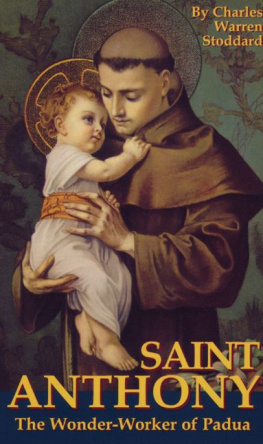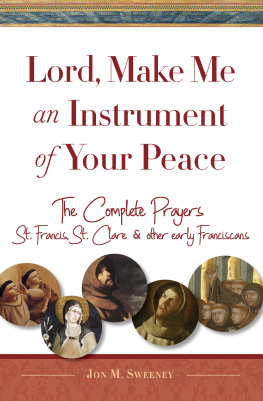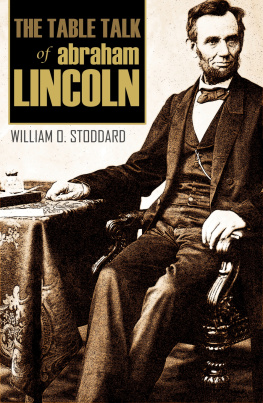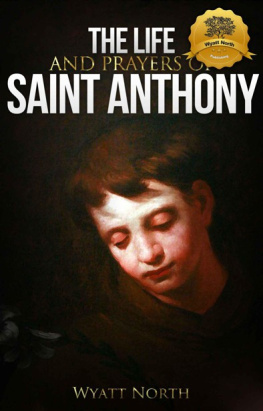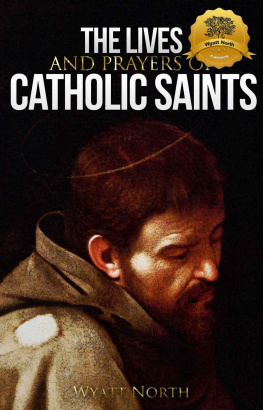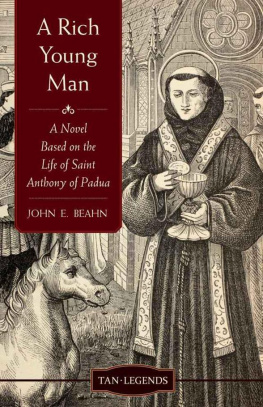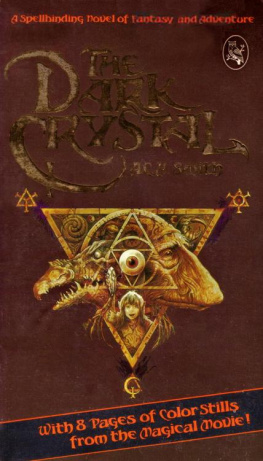Charles Warren Stoddard - St. Anthony: The Wonder-Worker of Padua
Here you can read online Charles Warren Stoddard - St. Anthony: The Wonder-Worker of Padua full text of the book (entire story) in english for free. Download pdf and epub, get meaning, cover and reviews about this ebook. year: 1971, publisher: TAN Books, genre: Detective and thriller. Description of the work, (preface) as well as reviews are available. Best literature library LitArk.com created for fans of good reading and offers a wide selection of genres:
Romance novel
Science fiction
Adventure
Detective
Science
History
Home and family
Prose
Art
Politics
Computer
Non-fiction
Religion
Business
Children
Humor
Choose a favorite category and find really read worthwhile books. Enjoy immersion in the world of imagination, feel the emotions of the characters or learn something new for yourself, make an fascinating discovery.
- Book:St. Anthony: The Wonder-Worker of Padua
- Author:
- Publisher:TAN Books
- Genre:
- Year:1971
- Rating:3 / 5
- Favourites:Add to favourites
- Your mark:
- 60
- 1
- 2
- 3
- 4
- 5
St. Anthony: The Wonder-Worker of Padua: summary, description and annotation
We offer to read an annotation, description, summary or preface (depends on what the author of the book "St. Anthony: The Wonder-Worker of Padua" wrote himself). If you haven't found the necessary information about the book — write in the comments, we will try to find it.
St. Anthony: The Wonder-Worker of Padua — read online for free the complete book (whole text) full work
Below is the text of the book, divided by pages. System saving the place of the last page read, allows you to conveniently read the book "St. Anthony: The Wonder-Worker of Padua" online for free, without having to search again every time where you left off. Put a bookmark, and you can go to the page where you finished reading at any time.
Font size:
Interval:
Bookmark:
SAINT ANTHONY
THE WONDER-WORKER
OF PADUA
SAINT ANTHONY
THE WONDER-WORKER
OF PADUA
By
Charles Warren Stoddard
The works that I do, he also shall do;
and greater than these shall he do.
TAN Books
Charlotte, North Carolina
Cum permissu superiorum
Originally published by THE AVE MARIA, Notre Dame, Indiana 1896.ISBN: 978-0-89555-039-2
Printed and bound in the United States of America.
TAN Books
Charlotte, North Carolina
2010
And these signs shall follow them that believe: In my name they shall cast out devils: they shall speak with new tongues. They shall take up serpents; and if they shall drink any deadly thing, it shall not hurt them; they shall lay their hands upon the sick, and they shall recover. Mark 16:17-18Amen, amen I say to you, he that believeth in me, the works that I do, he also shall do; and greater than these shall he do. John 14:12
Lest the present biography of St. Anthony appear precious or quaint or even fabulous to the sophisticated twentieth century reader, he should ponder first these words of Christ, used in commissioning His Apostles. These qualities were to be the hallmark of his devoted followers. Yet we today are prone to regard the miraculous as a phenomenon of the past, or even a superstition of less enlightened days.
But the words of Our Lord Himself gainsay this line of thought on our part. If we cannot believe in the miracles of His followers, perhaps it is because we no longer believe in Him, for to dispense of the miracles of His followers is to dispense of His words, and to dispense of His words is to dispense of the Lord Himself.
Not that the present volume really needs vindication, but the singularity of this life should either turn us toward Christ, for a deeper understanding of His mysteries, or it should turn us away from Christas a Person, as a Faith, as a Way of life that is incredible. This life of Saint Anthony of Padua should not leave us indifferent. It is of course our intent in reprinting this book that it lead others to a deeper probing of their Faith. It is hoped people will see in this great saint the lofty pinnacle to which sanctity can carry a mortal man. We ourselves are all called to be saints, and if we muddle through a hum-drum spiritual life, it is because we are content with spiritual mediocrity. But we know from our Lords harsh words in Apocalypse 3:16 how He regards the lukewarm. May this little book inspire in its readers a lasting devotion to St. Anthonya most powerful intercessorbut may it also work on them as leaven, to transform their lives in Christ.
Thomas A. NelsonOriginal Publisher
Table of Contents
The Five Friars
The afternoon shadows were lengthening under the walls of the monastery of Santa Cruz, a house of the Canons Regular of St. Augustine, at Coimbra. Life within that holy house stole on as slowly, as regularly, and for the most part as silently, as those deepening shadows. Each morning it was renewed as cheerfully as broke the dawn upon the waves that wash the shores of Portugal; each noon it was radiant with the fullness of spiritual joy; each evening it hushed itself to rest with prayer and praise; and these three epochs in the daily life of the cloister were heralded by the mellow peal of the Angelus as it was wafted over the embosoming hills, and throbbed into silence in far-off, fainting echoes.
Now and again something occurred in the monasterysomething slight in itself, but enough to break in upon the peaceful current of events and create an interest or excitement that fairly startled the gentle occupants. There were guests from time to timequite a number of them; for the worldly are ever curious concerning the inner life of those who though in the world are not of it. Therefore there was a guest-master at Santa Cruz, as there is always a guest-master in every monastery; and his office it is to receive those who desire to see the chapels, the relics, the cloisters. It is the duty and the pleasure of this guest-master to conduct visitors through the monastery and to entertain them; and thus relieve the friars from all distractions, such as sudden and unexpected calls from prayer or labor.
One day at Santa Cruz five stranger guests arrived three priests and two lay-brothers, disciples of St. Francis, whose Order was then but ten years old. These friars had been assigned to the mission in Morocco, and were on their way thither when they sought the hospitality of the Abbey of Santa Cruz. Who shall say that it was chance alone that brought them thither? They were Franciscans. Not far distant from Coimbra, the pious Queen of Portugal had established the Convent of St. Anthony of Olivares; it was situated in an olive grove, whence it derived its name. The house was small and poor, but it was large enough to shelter the five friars; and the Brother Questor, whose duty it was to ask alms for the needs of the brethren, would have gladly shared his frugal fare with these apostles who were on their way to martyrdom in Morocco. But they passed Olivares and sought the gates of Santa Cruz, and were there given heartfelt welcome.
Was it for this reason that, as the Franciscan chronicles tell us, Queen Urraca sent for and lovingly received the friars? For indeed she held their Order in great esteem, and inquired many things concerning their errand, most courteously offering to supply all their wants. Not content with the brief account of their Generals intention which they gave her, this lady, thirsting as the hart for the word of God, engaged them in spiritual discourse, drawing thence much sweetness and consolation; then, taking them apart, she besought them, for the love of Him for whose sweet name they were going to torments and death, to beg of Almighty God to reveal to them the day on which she should die. And, albeit the friars endeavored by all means to escape her importunity, saying that they were most unworthy to know the secrets of the Lord, and other words of like import, yet did she at length prevail with them to give her that promise which she craved. And so, after fervent prayer, they again came before the Queen and bade her be of good courage; for that it was the Will of God that her end should be very shortly, and before that of the King, her husband. Moreover, they gave her a sure sign; for, Know, lady, they said, that before many days we shall die by the sword for the Faith of Christ. Praised be His Divine Majesty, who has chosen us, poor men, to be in the number of His martyrs! Our bodies shall be brought into this city with great devotion by the Christians of Morocco, and you and your husband shall go to meet them. When these things shall come to pass, know that the time is come for you to leave this world and go to God.
The guest-master of Santa Cruz was a youth of four and twenty, who was already ordained. He had a marvellously beautiful countenance and was singularly engaging in manner. Naturally, he was thrown much in the society of the friars, and often conversed with them of the extraordinary history of Portiuncula and of the miracles wrought by their seraphic Father, St. Francis of Assisi. Certain it is that the five friars perished in their blood at the hands of the infidels. Their bodies were brought home in solemn state, attended by various supernatural manifestations calculated to inspire reverence and awe.
It was the Kings wish that these relics of the first Franciscan martyrs should rest in the principal church of the capital; but they were mysteriously guided or conveyed to the monastery of Santa Cruz, where they had lodged, and where His Majesty had a superb chapel erected, in which the relics were reposited.
Many marvels were witnessed at that shrine, and these deeply touched the heart and the spirit of the young guest-master. But a few months before he had held converse with these very friars, who were then joyously seeking the palm and the crown of martyrdom; now they were in paradise, and he was kneeling beside their holy dusta poor friar groping blindly after that light that should illumine him and make clear his path of life.
Next pageFont size:
Interval:
Bookmark:
Similar books «St. Anthony: The Wonder-Worker of Padua»
Look at similar books to St. Anthony: The Wonder-Worker of Padua. We have selected literature similar in name and meaning in the hope of providing readers with more options to find new, interesting, not yet read works.
Discussion, reviews of the book St. Anthony: The Wonder-Worker of Padua and just readers' own opinions. Leave your comments, write what you think about the work, its meaning or the main characters. Specify what exactly you liked and what you didn't like, and why you think so.

